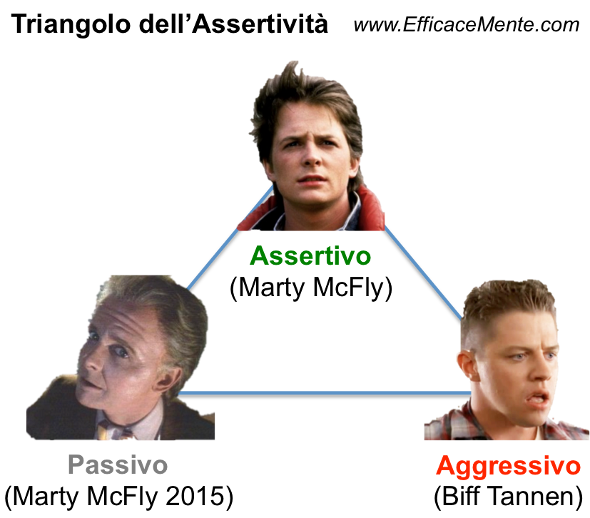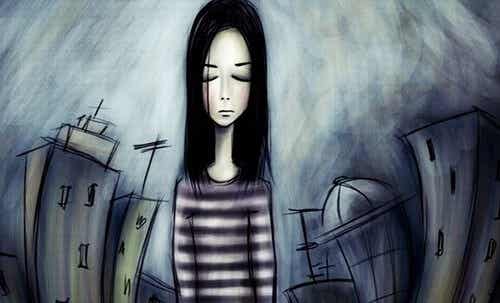Personal devaluation is probably one of the deepest and most common ailments of our times. How does it develop and what are its characteristics? To what extent can it affect us?

Last update: June 05, 2021
Personal appreciation, or good self-esteem, is the self-awareness of one's own resources and potential, as well as the recognition of weaknesses and shortcomings. Many people have low self-esteem and are confirmed by establishing unhealthy relationships. In this case, we speak of personal devaluation.
Attempts to compensate for low self-esteem generally fail, therefore the person continues to have a low opinion of himself over the years.
Personal devaluation, persistence and resistance to change
Many people seek recognition by pleasing others. They may be more or less susceptible to being ignored, but they live and grow by prioritizing the wishes of others and systematically procrastinating their own.
They behave this way so as not to feel like rags, cockroaches, useless, inept, invalid, grains of sand, donkeys, fools, idiots, to name a few belittling labels. However, no strategy is effective.
Therefore, basically, that feeling persists; it therefore means that it has not been resolved. All this leads to resistance to change.
When that something (a gesture, an action, a label, a style, a problem, etc.) is systematized over time, it becomes more resistant to change, which reduces creativity.
Those who remain stuck in personal devaluation are guided by a limited number of solutions. This leads them to make the same choices over and over, instead of looking for other options.
Repeat the same patterns waiting for different results
To solve their own problems, some people always apply the same measures over and over again, even if the result is never positive.
It is like trying to cure an ailment by increasing the dose of a drug more and more, even though you have already increased it repeatedly in the past and have not obtained any results.
We tend to repeat the same pattern that has already led us to unwanted results. We do this without questioning or modifying it to get really different results.
Repeating the same patterns over and over leads to the same results, which often turn out to be bankruptcy. These failures only confirm personal devaluation, reaffirming one's low self-esteem and all related and consequent feelings.
There are hundreds of examples of bankruptcy solutions. Those who have a phobia of elevators and other enclosed spaces, in facing the feared situation repeat themselves over and over again: "it won't happen to me, it won't happen to me!", Even if that sentence will have as its only consequence the triggering of a whole chain of related symptoms.
The anorexic person who, faced with the refusal of food, hears himself repeated by all his loved ones: "eat, eat!".
Or the man who suffers from depression and is listless, sad, distressed and does not want to get out of bed, to whom his wife suggests: "Look what a beautiful day, get up, let's go for a walk!", A phrase that brings him to feeling even more inept when faced with advice on what to do.
Looking for value outside, an ineffective strategy
Who takes refuge in personal devaluation, in the unsuccessful attempt to obtain recognition, when he obtains a result contrary to the desired one it actually ends up consolidating its own devaluation; instead he should try to give value to the environment that surrounds him.
This is the case of the "donors", who are always willing to help their entire affective circle and end up being used and mistreated. It is also the case of the "underestimated", who always privilege the wishes of others, suffer and feel frustrated because they have never fulfilled their own.
Both of these profiles seek to secure their relationships by becoming unconditional towards others. They give everything to others, looking for value in them, putting them first; they never stop feeling obligated and end up depending on an underlying bond position.
They do not allow the other to desire them or feel the need for them, as they are always there to satisfy every need even before they are asked to.
This level of emotional slavery does not allow the other to feel the need to be with the protagonist. Nor to miss them: if lack means remembering with desire the fact of being with the other, a devalued person who fills all the gaps will not make the other miss his own, his own need: they therefore become invisible.
In other words, unconditional love leads to invisibility, when what you are really looking for is the exact opposite. This effect only confirms the personal devaluation of those who already suffer from low self-esteem.
Other ineffective strategies
Another failure solution is to be the model pupil. Those young people who behind their tall faces and perfection hide the imperative need to be approved, esteemed and loved. Therefore, they do not generate any expectations, because their parents, friends, uncles and family already know that they will get the best results.
And this is how they end up losing importance, as a good grade is always expected from them and any outstanding performance will not cause any kind of surprise. Again, the effect obtained is opposite to the desired one.
There are also those who place themselves in a position of compassion, or weakness, to pity others, with the secret expectation that others will give them back an image of strength in which they express appreciation for their resources and abilities.
In general, they end up generating repulsion in people because their complaints and their victim attitude cause others to tire and avoid any encounters with the protagonists.
Sometimes awareness of personal abilities is realized on a rational level. The protagonist recognizes that he has a wide range of resources and claims to be appreciated. In reality it is a rational acknowledgment that makes you fall into the trap.
The person weakens, no longer has confidence in himself, he feels diminished. This can also be seen in the physical attitude, because the person hunches his back.
Behind the personal devaluation: insecurity, fear and guilt
Another consequence is insecurity. When an individual has no self-esteem, he has no confidence in any situation. In this sense personal devaluation and insecurity go hand in hand. Two parallel feelings.
An insecure person is insecure because they believe they have no means or resources to sustain their performance. But there is a third concept that completes the trilogy: fear.
A consequence of low self-esteem is fear. The person is full of negative thoughts that immobilize him and because of which he is ashamed to face situations. He also experiences feelings and thoughts that lead him to impotence.
There is a fourth feeling: the sense of guilt. This is the constant feeling that generally accompanies all forms of personal devaluation. “I should have finished already; how can I be so stupid; if I had already finished, they would have given me the promotion ”and many other inner voices that make the person even more tormented.
Personal devaluation: not to love yourself ...
A person who does not appreciate or believe in their abilities she feels unable to act because she feels insecure, he doubts that his methods are consistent and correct. Then the doubt arises.
The individual is full of questions that only increase their initial anxiety and doubts. Among the thousand questions, he still tries to design a plan or come up with various strategies and ways to achieve his goal. In doing so, he wants to anticipate situations to feel safer.
In the imagination of the person afflicted by personal devaluation, any situation can become a test in which it will be established whether it is worth something or not worth anything. Fantasies of failure and lack of recognition assail her, fantasies that lead to fear.
Fear of being belittled and of really finding out who he is. Fear that one's own imperfections and ineptitudes will be exposed. Fear clouds him, obscures his abilities.
Is healthy self-esteem possible?
Low self-esteem is a feeling that wastes you and it thwarts projects, blocks the possibilities of being creative, generates insecurity, thus fueling anguish and anxiety and complicating the complexity of human relationships. It is like a plague that gradually erodes, destroys, penetrates, silently or abruptly, deteriorating the personality.
In reverse, true self-esteem is something you can feel. It is a sensation that emerges spontaneously in the face of experience. It is an inner feeling that does not depend on external recognition, but only on oneself.
Feeling appreciated is a state, a tendency to draw the positive from situations, from people and from life in general, which also allows us to understand that we are not always suitable for all activities or situations. It would be a mechanism of omnipotence to believe that we are suitable for everything.
Let's take care of ourselves, we cultivate self-love and avoid falling into personal devaluation. We don't need it, not even a bit.


























